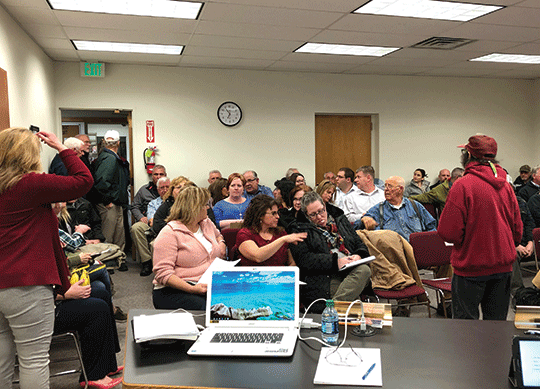
CONCERNED CITIZENS • A large group attended a public hearing to discuss and voice concerns over a proposed Holiday Inn Express in Nephi. City administrator Seth Atkinson explained the reasoning behind the Community Reinvestment Agency’s decision to issue a bond for the project.
By Myrna Trauntvein
Times-News Correspondent
Nephi City Council members began to look at economic development options back in 2013.
Seth Atkinson, city administrator, was asked by Glade Nielson, mayor, to review the history of the hotel project.
“Through feedback from existing community and business leaders, attracting a mid-tier hotel with a conference center component became a priority,” said Atkinson.
He said that the way it will work is that the Community Reinvestment Agency (CRA) will issue a bond for $1,300,000. The bank will purchase the bond and lend the money. The owner will provide private financing of the loan and equity. The resources will be pooled to construct the hotel. The hotel will generate taxes (property, sales, transient room taxes) and taxes will be used to pay off the CRA bond.
In 2015, a company called Better Cities assisted the city with conducting a feasibility study, said Atkinson. The study showed that, with some public assistance, a hotel meeting the criteria could be attracted to develop in Nephi.
A request for proposals was issued and the city received a positive response from an experienced hotel developer.
“In 2017, the city sought after, and received, support from the various taxing entities. The Community Reinvestment Area was created at the end of 2017,” Atkinson said. “A public hearing was held at that time. A project Plan and Budget were made public as well.”
Throughout 2018, the details of the project were being worked out when the commercial lender raised concerns about the Loan to Value ratio. The bank was more than willing to lend on the commercial loan but found that adding in the public bond pushed against regulations concerning the Loan to Value ratio. They requested that the city provide a financial guaranty to improve the credit risk.
“The Council opted to seek out options from other lenders before providing a financial guaranty,” he said. “Without the commercial loan and the accompanying collateral, it was tough for other lenders to not require the same thing.”
Toward the end of 2018, the council gave direction to provide this financial guaranty and signed an agreement in January 2019 to this effect.
“Now that the financial guaranty is in place, the city has sought options from lending institutions and received six offers,” Atkinson said.
This brings us to the present, where a public hearing is being held to seek input on issuing $1.3 million in bonds for the Community Reinvestment Area project. This amount would be reinvested into the project to assist with the hotel development and spur economic growth in the area. The hotel will also contain the conference room component due to the public assistance.
Current property taxes on the property bring in $741 annually which would be $14,070 over the 20-year life of the project. The estimated property tax increment after project is expected to be $60,107 annually or $1,202,140 over the 20-year life of the project. The tax increment financing for CRA will bring increase of 8,561 percent. Property taxes will increase from the $741 now collected to $60,000.
He said that the average annual tax collections coming from sales tax, transient room tax and property tax is $125,000 and the annual debt payment is $100,000.
Atkinson also addressed several commonly asked questions as part of his presentation.
As to public involvement in a private venture he said that many governments offer public incentives to further economic development goals.
The State of Utah allows governments to work together and agree on how to structure any economic development options through something called a “Community Reinvestment Area.” In this case, the government entities, led by the city, agreed to use tax revenues to encourage the development of a mid-tier level hotel with amenities such as a pool, business center, fitness center, etc. and a conference area to locate to Nephi.
“The economic development goals of the city are to use Nephi’s central location as a place to host conferences and training sessions from around the state,” Atkinson said.
The city is making active investments into the community to increase the number of visits to the community. This includes recreation improvements and the substantial support offered by the city to host a number of events each year.
There are no direct property tax incentives for this project. The private investment is $6,158,000 and the public investment is $1,300,000 for a total investment of $7,458,000.
He said that it is common for banks to reduce risk by requiring that there be an additional guaranty along with the collateral of the property. With Nephi’s strong credit position, it has an opportunity to receive a competitive interest rate by providing this guaranty.
“The project is estimated to produce more in tax revenue each year than would be needed to fund the debt payment requirements,” Atkinson said.
According to the state law, the money generated from a development in the Community Reinvestment Area must be reinvested back into the same area and cannot be used to fund improvements in other areas of the community.
“However, any taxes generated from complimentary development could be spent on improvements in the community,” he said. “Also, these revenues would not be available without the project moving forward.”